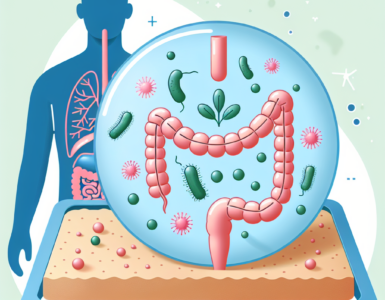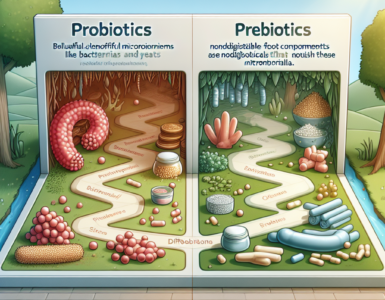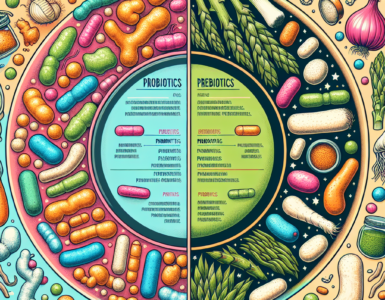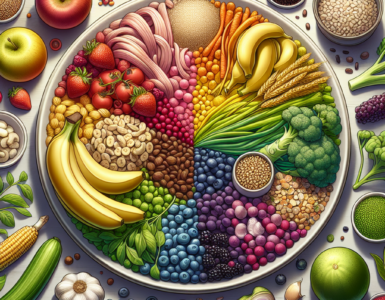The Role of Carbohydrates in Your Diet
Carbohydrates play a fundamental role in maintaining a balanced diet. They serve as the body’s main source of energy and are crucial for proper organ function and overall health.
Understanding Carbohydrates
Carbohydrates are one of the three macronutrients—alongside proteins and fats—that the body requires in large amounts. They are comprised of sugar molecules, which the body breaks down into glucose, the primary energy source for cells, tissues, and organs.
| Carbohydrate Category | Examples |
|---|---|
| Sugars | Glucose, Fructose, Sucrose |
| Starches | Grains, Potatoes, Corn |
| Fiber | Vegetables, Whole Grains, Nuts |
Simple vs Complex Carbohydrates
The classification of carbohydrates into simple and complex is based on their chemical structure and how quickly they are digested and absorbed by the body. Simple carbohydrates, often referred to as simple sugars, consist of one or two sugar molecules and are rapidly absorbed, leading to quicker energy spikes. In contrast, complex carbohydrates have three or more sugar molecules, typically forming longer chains, and they are digested at a slower pace, offering a more sustained energy release.
| Type | Description | Digestion Rate |
|---|---|---|
| Simple Carbohydrates | 1-2 sugar molecules | Rapid |
| Complex Carbohydrates | 3 or more sugar molecules | Slower |
The Importance of Carbohydrates for Energy
Carbohydrates are the body’s primary fuel source, especially during high-intensity activities. Glucose from carbohydrates is stored as glycogen in muscles and the liver, and it’s used to produce ATP (adenosine triphosphate), which powers muscle contractions and other vital functions. Consuming adequate amounts of carbohydrates ensures that individuals have the energy needed to perform daily activities and maintain metabolic health.
| Activity Level | Carbohydrate Needs (grams) |
|---|---|
| Sedentary | 130-150 |
| Moderate | 150-250 |
| High Intensity | 250-300+ |
Understanding the different types of carbohydrates and their effects on energy levels is essential for health-conscious individuals or families. Selecting the right sources of healthy carbohydrates can significantly impact one’s overall well-being and vitality.
Identifying Healthy Sources of Carbohydrates
Carbohydrates are a fundamental part of a balanced diet, providing the body with glucose which is converted into energy used to support bodily functions and physical activity. Identifying and incorporating healthy sources of carbohydrates into meals is crucial for maintaining overall health.
Whole Grains as a Source of Complex Carbohydrates
Whole grains are a nutritious source of complex carbohydrates that provide sustained energy. Unlike refined grains, whole grains include the entire grain kernel, which contains the bran, germ, and endosperm. This trio contributes to a higher content of fiber, vitamins, and minerals.
Consuming whole grains can help improve cholesterol levels and lower the risk of heart disease, stroke, obesity, and type 2 diabetes. Here are some whole grains that are healthy carbohydrate sources:
| Whole Grain | Fiber (g per 100g) | Carbohydrates (g per 100g) |
|---|---|---|
| Quinoa | 2.8 | 21.3 |
| Brown Rice | 1.8 | 23.5 |
| Oats | 10.6 | 66.3 |
| Barley | 15.6 | 73.5 |
Legumes and Their Nutritional Benefits
Legumes, which include beans, lentils, and chickpeas, are packed with nutrients and are an excellent source of protein and fiber. They have a low glycemic index, which means they have a minimal impact on blood sugar levels. Legumes also provide a significant amount of complex carbohydrates that are essential for long-lasting energy.
Including legumes in the diet can contribute to better digestive health, reduced risk of heart disease, and weight management. Nutritional values for common legumes are as follows:
| Legume | Fiber (g per cup) | Carbohydrates (g per cup) |
|---|---|---|
| Black Beans | 15 | 41 |
| Lentils | 15.6 | 39.9 |
| Chickpeas | 12.5 | 45 |
Fruits: Simple Carbohydrates with a Nutritional Punch
Fruits are a natural source of simple carbohydrates, but they are also high in fiber, vitamins, and antioxidants. The natural sugars found in fruits provide a quick energy boost, while the fiber ensures a slow and steady release of glucose into the bloodstream.
Fruits are an integral part of a healthy diet and can significantly contribute to overall health and well-being. The following table outlines the carbohydrate and fiber content in common fruits:
| Fruit | Fiber (g per medium fruit) | Carbohydrates (g per medium fruit) |
|---|---|---|
| Apple | 4.4 | 25 |
| Banana | 3.1 | 27 |
| Orange | 3.1 | 15.5 |
| Berries (1 cup) | 8 (for raspberries) | 15 (for raspberries) |
Vegetables: Low-Calorie, High-Fiber Carbohydrate Sources
Vegetables are low in calories but high in fiber and essential nutrients. They are an important source of carbohydrates, particularly for those looking to manage their weight and improve their health. Vegetables offer a broad spectrum of vitamins, minerals, and antioxidants that support overall health.
Incorporating a variety of vegetables into the diet ensures a wide range of health benefits. The following are the carbohydrate contents for several vegetables:
| Vegetable | Fiber (g per 100g) | Carbohydrates (g per 100g) |
|---|---|---|
| Broccoli | 2.6 | 7 |
| Spinach | 2.2 | 3.6 |
| Carrots | 2.8 | 10 |
| Sweet Potatoes | 3 | 20.1 |
In conclusion, choosing whole grains, legumes, fruits, and vegetables as sources of healthy carbohydrates can contribute to a balanced diet and provide numerous health benefits. These food groups offer a combination of fiber, vitamins, minerals, and energy-supporting carbohydrates that are essential for maintaining a healthy lifestyle.
The Impact of Carbohydrate Quality on Health
The quality of carbohydrates in a diet significantly influences overall health. This impact is seen in aspects such as blood sugar regulation, digestive health, and weight management.
Blood Sugar Regulation and Glycemic Index
The glycemic index (GI) is a ranking system for carbohydrates based on their immediate effect on blood glucose levels. Carbohydrates that break down quickly during digestion have a high GI; those that break down slowly, releasing glucose gradually into the bloodstream, have a low GI.
| Food Type | Glycemic Index (GI) Range |
|---|---|
| Low GI | 55 or less |
| Medium GI | 56 – 69 |
| High GI | 70 or higher |
Selecting carbohydrates with a low to medium GI can help in maintaining stable blood sugar levels, which is especially important for individuals with diabetes or those at risk. Foods with a low GI value are slower to digest and can lead to a more gradual rise in blood sugar levels.
Dietary Fiber and Digestive Health
Dietary fiber, a complex carbohydrate, is critical for digestive health. It adds bulk to the stool and helps keep the digestive system running smoothly. Foods high in fiber also tend to be more filling, which can aid in appetite control and prevent overeating.
| Food Source | Fiber Content (grams per serving) |
|---|---|
| Whole Grains | 3 – 8 |
| Legumes | 6 – 15 |
| Fruits | 2 – 5 |
| Vegetables | 1 – 4 |
Incorporating a variety of fiber-rich foods into the diet is recommended, as it not only aids in digestion but also provides a range of other nutrients.
Carbohydrates and Weight Management
The type and quantity of carbohydrates consumed can influence weight management. Complex carbohydrates, such as those found in whole grains and legumes, are digested more slowly and provide a sense of fullness, which can help in controlling calorie intake.
| Carbohydrate Source | Caloric Content (calories per serving) |
|---|---|
| Whole Grains | 80 – 120 |
| Legumes | 100 – 200 |
| Fruits | 50 – 100 |
| Vegetables | 20 – 50 |
Choosing sources of healthy carbohydrates that are high in fiber and low in added sugars can support weight management goals. Balancing carbohydrate intake with physical activity is also essential for maintaining a healthy weight.
In conclusion, selecting high-quality carbohydrates is vital for managing blood sugar levels, supporting digestive health, and aiding in weight management. By preferring low GI, fiber-rich food sources, individuals can enjoy the benefits of carbohydrates while minimizing potential health risks.
Integrating Healthy Carbohydrates into Your Meals
Incorporating sources of healthy carbohydrates into your daily diet is a key component of balanced nutrition. Understanding portion control, discovering creative ways to add these nutrients, and interpreting food labels are fundamental in making informed choices that align with your health goals.
Portion Control and Balance
Portion control is paramount when it comes to including carbohydrates in your meals. It’s not just about the quantity, but also the quality of the carbs you consume. A balanced meal includes carbohydrates in harmony with proteins and fats to ensure a well-rounded nutritional profile.
For effective portion control, consider using your plate as a guide:
- Fill half of your plate with vegetables and fruits.
- Allocate one quarter of the plate for whole grains.
- Reserve the remaining quarter for protein sources.
This method helps in managing portions without the need for meticulous counting or measuring.
Creative Ways to Include More Healthy Carbs
There are numerous ways to introduce more healthy carbohydrates into your diet without feeling monotonous. Here are some creative suggestions:
- Swap out white rice with quinoa or brown rice.
- Use lettuce wraps instead of bread for sandwiches.
- Add a variety of legumes to salads for an extra boost of complex carbs.
Incorporating these sources of carbohydrates can enhance the nutritional value of your meals while keeping them exciting and diverse.
Reading Food Labels for Carbohydrate Content
Understanding food labels is crucial in selecting sources of healthy carbohydrates. The label provides information about the type and quantity of carbohydrates in a product.
When examining food labels, look for the following details:
- Total Carbohydrates: Includes all types of carbohydrates in a serving.
- Dietary Fiber: A key component of complex carbohydrates.
- Sugars: Includes both natural and added sugars.
| Nutrient | Amount per serving |
|---|---|
| Total Carbohydrates | 30g |
| Dietary Fiber | 5g |
| Sugars | 8g |
Selecting foods with higher fiber content and lower added sugars can help maintain energy levels and promote digestive health. Being mindful of the carbohydrate content on food labels is an effective way to manage your intake of healthy carbs.
Disclaimer: This content is for informational purposes only and is not intended as medical advice. The role and impact of carbohydrates in the diet can vary significantly among individuals, depending on factors such as health status, metabolic conditions, physical activity levels, and personal health goals. It is important to consult with a healthcare provider or a registered dietitian before making significant changes to your carbohydrate intake, especially if you have health conditions like diabetes. Always seek professional guidance to tailor dietary choices to your individual needs











